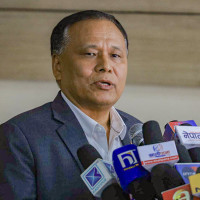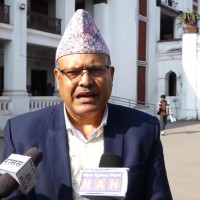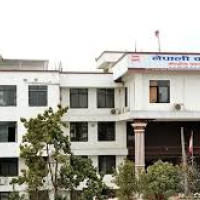- Monday, 29 December 2025
We have made strides in infrastructure
In the first local level election, Hukum Singh Rai, who tied with his opponent rival Menuka Kafle Pokhrel, lost in a tiebreaker decided by a lottery. However, he later won the chairman’s position in the second local-level election by a substantial margin. Our correspondent Bishnu Prasad Pokharel recently talked to Chairman Rai focusing on the development activities carried out in the rural municipality.
What have you accomplished in the last two and a half years?
Upon my election as chairman of this rural municipality, my three priorities were declaring the municipality child-friendly, operating a government hospital with health insurance programmes and constructing an administrative building.
Today, Kamal Nagar Hospital is operational and since last year, we have implemented a child-friendly governance model. Due to some delays in decision-making, the administrative building was inaugurated just a month ago. Additionally, administrative buildings for all seven ward offices have been completed. We believe we have made significant strides in building the municipality's infrastructure while advancing education, healthcare, agriculture and other essential sectors across the municipality’s extensive geography.
What improvements have been made in the education sector?
In the first year, our focus was agriculture, but this year, we are prioritising education. We are enhancing school infrastructure and adjusting the teacher-student ratio to make community education effective and productive. We have also kept schools free from political influence, focusing solely on educational outcomes. Another significant step is managing the teacher-student ratio by reallocating teachers where needed. This initiative began in Ward No. 7, where teachers from schools with fewer students are being reassigned to schools with higher enrollment within the municipality. In addition, we have introduced programmes to encourage teachers and we are providing scholarships for the marginalised and economically disadvantaged students.
How are priority projects selected?
It is challenging to predict which issues will take precedence at any given time. For instance, while we are currently advancing programmes in infrastructure, education, health and agriculture, we will shift focus to tackle natural disasters if they were to occur. Therefore, our priorities are largely situation-driven. As mentioned, education is our primary focus this year. Our plan aims to make substantial improvements in community schools, ensuring a safe environment for children, preventing drug exposure and introducing English-medium instruction.
There is often criticism that local governments do not prioritise agriculture. How do you respond?
We have ongoing programmes to encourage the use of modern agricultural technology to engage farmers in commercial farming. We promote off-season rice cultivation, livestock farming and training programmes directly in the fields. We also continue providing subsidies for irrigation to support farmers. Kamal Rural Municipality’s production of organic fertilisers has gained nationwide recognition and we are distributing our brand, Kamal Liquid Fertiliser, to farmers free of charge.
It is often said that only physical infrastructure development is considered progress, while human resources are neglected. What is your view on this?
We are certainly focusing on human resources as well. Development is no longer solely defined by physical infrastructure. With our limited resources, we are making an effort to address human resource development too. We have programmes aimed at the holistic development of children and ensuring fundamental rights for all citizens. We are conducting skill-oriented training programmes to support income generation for economically disadvantaged citizens.
In Ward No. 3, Kerkha, we have appointed trainers to run tailoring and cutting classes, aiming to connect skills with technology to help women become entrepreneurs. We are also working with various donor and partner organisations to provide vocational training for people with disabilities. For those returning from abroad, the municipality has a policy to utilise their skills and knowledge locally.
What are some long-term, memorable projects you have undertaken or planned to pursue?
We have launched several projects with long-term impact. We established Kamal Municipal Hospital to provide expert healthcare services, including health insurance. Another notable project, not only for Kamal Rural Municipality but for the entire eastern region, is constructing a stadium. This ambitious project requires support from federal and provincial governments and donor agencies, as it cannot be completed with local resources alone. We began by securing the stadium area with a permanent boundary wall last fiscal year.
We also plan to construct a community centre with a large assembly hall in Kyampa and a senior and child-friendly park in Manglabare Bazaar. In addition, there is a pressing need for clean drinking water across much of the municipality, which necessitates a substantial budget. We are optimising our available funds and advocating for more federal support to address this need.
The rural municipality is getting urbanised, so we are focusing on beautifying our market areas. We have launched model projects in the selected areas to create clean, green and attractive spaces. Moreover, we aim to develop the Sadhuholi and Chanju wetlands to support eco-friendly development and promote internal tourism.
















